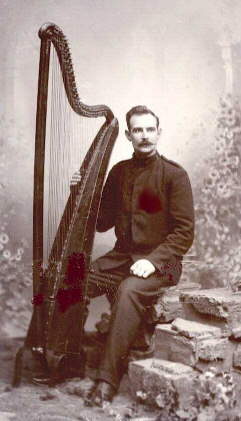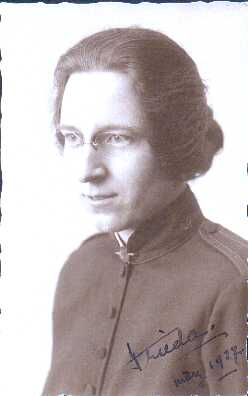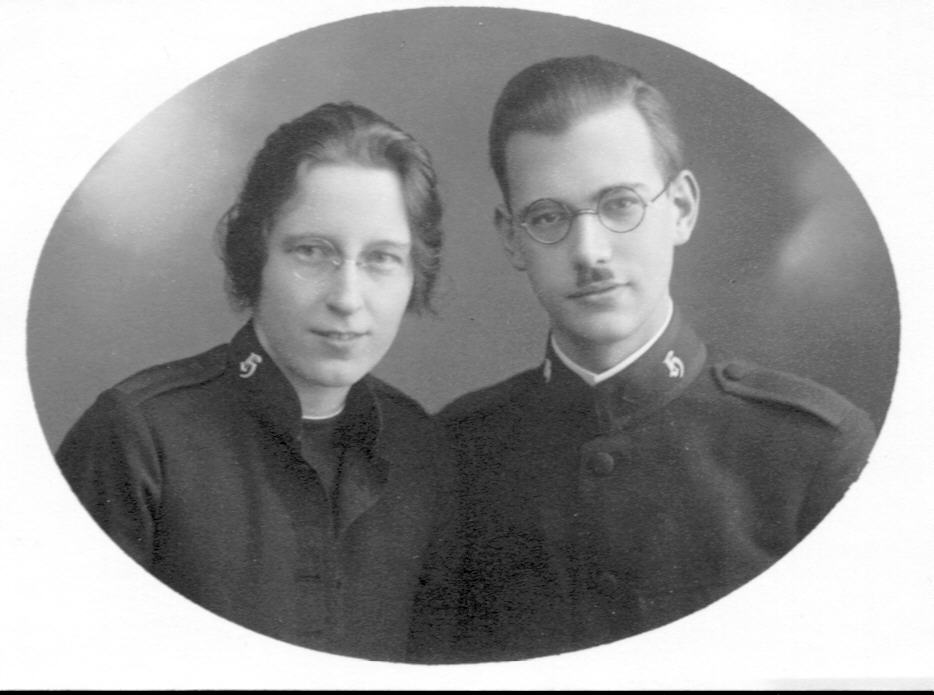15
David's Wrath and the Happy End (1)
Erik's father David was made of different matter. Erik describes him as
"an artistic nature, impulsive, easily moved, intense", but without much
schooling. He and his sister Ellen attended the Army's first meeting in
Göteborg (Gothenburg, Sweden) as teenagers. He was at once attracted
especially by the joyful singing and instrument playing.
| Some years later he became a soldier and was expelled from his family
("I left their house and have never set my foot there again", he had told
Dad at one time.)
He soon became an officer and was seen and heard playing several difficult
instruments -- harp, bandonion, consertina. How he managed to learn
these instruments I do not know, as he had had no training and didn't even
know how to read written music. But then he did no virtuoso playing, but
just pulled out a few chords which very effectively accompanied his own
singing.
He could be very kind and considerate and was known as a good chief
and leader. But he could also show a temper that gave him difficulties.
It is said that his appointment to Switzerland in 1922 was some sort of
punishment, but I only know it as a rumour...
|
 |
When David became angry he took to silence. The more angry the more silent
and the more dark clouds in his forehead.
For instance, while in school Erik learnt to play chess and became rather
good. In his teens he won a junior championship at the local Chess Club
in Stockholm. This meant he had to go one or more evenings a week to the
Club to play. He came home late, his clothes reeking of tobacco since there
was much smoking at the Club. David detested this, but he never said anything.
He just stayed up until Erik got home, then showed him silence and went
to bed.
Another time when Erik (with one of his first earned salaries) bought
himself a pair of shoes without consulting David, there was also difference
of opinion between them. For David shoes should be high and black -- Erik
bought low and brown. David remained silent for a long time.
But all this was nothing compared to what happened when Erik told
his parents that Frieda and he were getting married! Father David
was severely appalled, and rebuked Erik strongly. Erik was very surprised.
Both his father and his mother had liked Frieda very much. She had been
like an daughter to them. Even after Erik left for London Frieda continued
to come for Sunday afternoon coffee and a bit of gossip with Betty.
According to SA rules a Cadet was not allowed to write to someone of
the opposite sex (outside the family) while in Training. So Erik did not
write to Frieda. But he did write to his mother, who in turn reported in
full to Frieda. And there were no rules to hinder Frieda from writing to
him.
Now what was suddenly wrong with Frieda? David pointed out two things:
her age and her health. Frieda was nearly five years older than Erik. The
regulation in those days was that the wife's career must follow her husband's,
i.e. same rank, same shared ministry, same date of retirement. "Just think
of it", David told his son. "By the time you are 65 she will already have
worked over time for five years. And if you should become a Commissioner
(with a retirement age of 70) she will have to toil until 75!" Also Frieda
had had long periods of bad health in the past. How would she cope with
the strenuous life of a married woman officer?
Now such arguments have never impressed the young. Erik had never
thought much about the age difference, and Frieda seemed to be healthy
enough at the time. But the Commander of the Territory (Colonel Mary Booth)
had to consent to an international marriage of this kind (Frieda was assisting
officer at a social institution in England). David told Mary Booth to stop
this marriage, and therefore she had some serious talks with Erik.
| Did he really know what he was doing? When did he last meet Frieda?
(Since December, 1924, when Erik left Berne after the Christmas break in
Training, they had met only once, briefly, at an Officers' Staff Course
at Sunbury outside London in January, 1926. That had been more than a year
ago.)
Well, the age and health arguments were taken care of by their superiors.
Apparently these people in high positions wanted to have this matter settled.
Very unconventionally Erik was ordered to go to London (journey paid) to
meet Frieda and talk things over. Frieda's chief was Commissioner Catherine
Bramwell-Booth. She arranged for the young couple to meet at an old folks
Home in Hastings for a week. There they met, walked and talked, and at
the end of the week they had made up their minds:. Nothing was to separate
them. |

|
Mary Booth signed the application form: "Do not recommend, but cannot
very well refuse." And David went into silence. Erik and his father were
sitting at the breakfast table without a word and with the storm clouds
all around. Betty was very unhappy but did not know what to do.
Frieda was sent to Berlin and given an appointment in a Maternity Home
(Wöchnerinnenheim). She knew how to handle sturdy old fathers (had
had good practice with her own old man!). At her arrival she immediately
re-charmed David and Betty. The clouds flew away from David's forehead
as he melted as wax. "Amazing" Erik comments. Click here for a picture
showing the result (although
taken in 1929, the picture does not indicate that David was unpleased...).
Erik and Frieda could not marry until some months later. It might have
had to do with German law or with Army rules. Dated photos show that during
this time they did some travelling and visiting. Among others are photos
from Clarens (near Montreux) in Switzerland, where they saw M. and
Mme
Perret (who will later play a role in this story). The
opening
picture in this story was taken at Chateau de Chillon near Montreux
in 1928.
Frieda came to Berlin in the fall of 1928. At about the same time David
and Betty received orders to go to Denmark, David as Territorial Commander.
The wedding did not take place until March 7, 1929.
In his unpublished memoirs Dad has written:
We rented a part of a big apartment at Cöpenicker
Strasse 49 with the family Maison, who later were to be our good friends
-- to a large extent because of Frieda's winning manners. Our apartment
had a big kitchen and a big, dark room, a so called "Berliner Zimmer."
To that a cold loggia and a dark, small chamber -- all against a gloomy
back yard. No toilet inside -- it was half a story down. No bathroom. We
got ourselves a big zink tub in which we bathed after warming water in
the kitchen.
But here we were happy, and we got on well.
In a good tale, this should be the happy end. But in real life the story
continues, for better or for worse.
Updated 1999 02 23; 03 15;
webmaster: sw@abc.se


